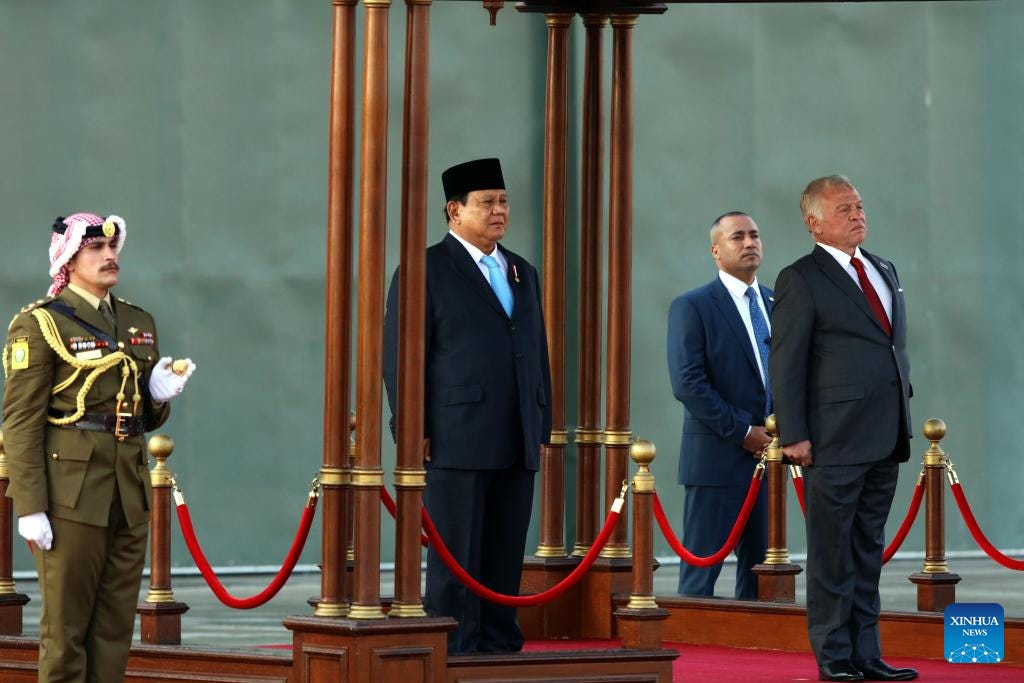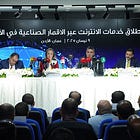Indonesia and Jordan: Towards Netanyahu’s 'Gaza 2035'?
Prabowo’s Defence Diplomacy signals a pivot and a strategic shift toward the IMEC and US-Aligned Regional Frameworks.
On 14 April, Indonesian President Prabowo Subianto and King Abdullah II oversaw the signing of three Memoranda of Understanding (MoUs) in Amman, spanning cultural, agricultural, and defence sectors. This followed a fruitful visit to Abu Dhabi, where similar high-stakes agreements were secured. Notably, a defence pact was signed, building on a steady security cooperation relationship. Coinciding with Jordan’s ban on the Muslim Brotherhood and the implementation of heightened security measures, alongside Indonesia’s strategic framing of the Gaza issue during Prabowo’s Middle East tour, this signals a deeper alignment with US-led regional security frameworks—a step forward for Trump’s Netanyahu-based Gaza 2035 plan.
Defence Against Resistance: Indonesia and Jordan’s Strategic Alignment
Indonesia and Jordan share a longstanding defence relationship centred on counter-extremism and combating Islamist groups. This partnership gains renewed significance following Jordan’s comprehensive ban on the Muslim Brotherhood, announced on 23 April. The ban underscores a mutual commitment to regional stability, with Jakarta positioning itself as a reliable partner in a volatile geopolitical landscape.
On 14 April 2025, the two Muslim-majority nations signed a defence cooperation agreement alongside three MoUs covering cultural, agricultural, and defence sectors. While the specifics of the defence pact remain undisclosed, it is likely designed to bolster Amman’s surveillance and suppression capabilities against opposition groups and pro-Palestine movements perceived as threats to regime stability.
Jakarta’s strategic focus on the Gaza issue, a central theme of President Prabowo Subianto’s Middle East tour, coupled with Indonesia’s pledge to accept 1,000 Gazans, signals a calculated effort to deepen its role in a US-aligned Gaza reconstruction framework. Although Indonesia previously endorsed Egypt’s reconstruction proposal, its recent agreements with the UAE and strengthened ties with normalising countries suggest openness to the US-backed Gaza 2035 plan. Originally proposed by Israeli Prime Minister Netanyahu’s office, this plan is perceived to favour Gulf states by creating business opportunities and securing their role in a Middle East–Europe trade corridor. With GCC-ASEAN trade reaching US$130.7 billion in 2023, a Gulf-led economic win in Gaza, and thus broader regional integration, also benefits ASEAN, particularly Indonesia.
Implications for the India-Middle East-Europe Economic Corridor (IMEC)
Indonesia’s deepening engagement with Israel-normalising states and its strategic embrace of US-aligned security and reconstruction frameworks in the Middle East carry direct implications for the IMEC. The corridor, announced at the 2023 G20 summit, envisions enhanced infrastructure and energy connectivity between India, the Gulf, and Europe. While Indonesia is not a formal IMEC member, its latest moves position it as a prospective stakeholder in the corridor’s auxiliary frameworks—particularly as ASEAN-GCC trade accelerates and Jakarta enhances bilateral ties with key IMEC participants such as the UAE, Saudi Arabia, and Jordan.
By aligning with regional security frameworks that underpin IMEC—especially those designed to stabilise Gaza and secure Red Sea trade routes—Indonesia is signalling its intention to become a reliable partner in Middle East connectivity strategies. The defence cooperation agreement with Jordan and the energy partnerships secured in Abu Dhabi align with IMEC’s broader aims: safeguarding supply chains, integrating infrastructure projects, and reinforcing political stability across transit corridors.
Moreover, Jakarta’s willingness to cooperate on sensitive issues such as post-war Gaza reconstruction—potentially within the scope of the US-backed Gaza 2035 plan—suggests a longer-term ambition to play a role in the socio-economic reshaping of the region. If Indonesia continues to embed itself within Gulf-led initiatives, it could eventually be integrated into IMEC’s logistical or trade ecosystems through digital infrastructure agreements, renewable energy collaborations, or regional investment mechanisms.





